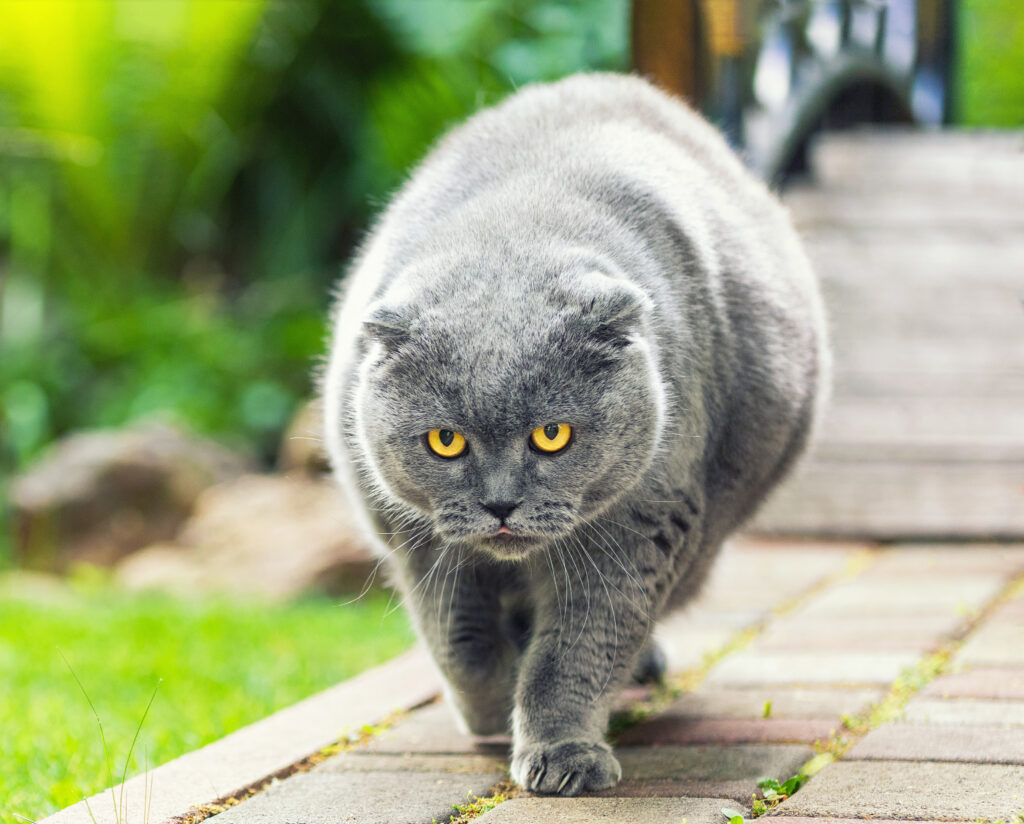
Written by Rachel Holly
Vet-reviewed by: Kevin Smith, DVM, Richmond Road Vet Clinic
In recent years, the health and well-being of pets have become an increasing focus for pet owners and veterinarians alike. Pets are no longer seen as “just an animal” but much -loved family members. As a result, we strive to maintain their health and well-being as we would our own.
One of the most alarming issues facing pets today is the rising prevalence of chronic diseases and obesity. Pets, particularly dogs and cats, are just as susceptible to the negative long-term effects of a poor diet, weight gain, and inactivity as people are. The good news is it is preventable. Understanding the link between obesity and chronic diseases in pets, can help pet owners make informed decisions about their pets’ health and give them the gift of a longer healthier life.
Obesity in Pets: A Widespread Epidemic
Obesity in pets has reached alarming levels in recent years, with an increasing number of dogs and cats being classified as overweight or obese. According to the Association for Pet Obesity Prevention (APOP), an estimated 61% of cats and 59% of dogs in the United States are overweight or obese. This is a staggering statistic. Think about it: none of what we call “common” conditions – arthritis, cancer, heart disease- affect anywhere near half of the pet population at one time. This highlights the severity of the problem, which is growing worldwide.

As in humans, obesity in pets is often caused by an imbalance between the calories consumed and calories burned. Factors such as overfeeding, high-calorie diets, table-scrap feeding, and lack of exercise can lead to pets packing on the pounds. Pets who lead sedentary lifestyles, such as those that spend most of their time indoors or do not receive regular exercise, are particularly vulnerable to becoming obese.
Health Risks Associated with Obesity in Pets
Just as with humans, obesity in pets can lead to a range of serious health issues, many of which are chronic and long-lasting. These include:
- Joint Problems and Arthritis: Osteoarthritis and hip dysplasia can cause chronic pain and reduced mobility. While these conditions may occur anyway in an aging pet, excess weight puts additional stress on a pet’s joints, exacerbating the symptoms.
- Heart Disease: Obesity increases the risk of cardiovascular issues in pets, including high blood pressure, heart disease, and heart failure. Studies have shown that obese pets are more likely to develop these conditions earlier in life, often resulting in a shorter lifespan.
- Diabetes: Overweight pets, especially cats, are at a higher risk of developing diabetes. This chronic condition results from the body’s inability to regulate blood sugar levels effectively and requires diligent maintenance on a pet owner’s part.
- Respiratory Problems: Overweight pets may experience difficulty breathing or develop conditions like sleep apnea. Obesity can lead to reduced lung function, making physical exertion more difficult.
- Liver Disease: Obesity can lead to fatty liver disease, which impairs liver function and can lead to long-term health problems.
- Cancer: Some studies suggest that obesity may increase the likelihood of certain types of cancer in pets, including breast cancer in female dogs and feline lymphoma.
Chronic Diseases Linked to Obesity
Chronic diseases in pets are often worsened or directly caused by obesity. Here are some of the chronic conditions linked to being overweight:

- Chronic Kidney Disease (CKD): Overweight pets are more likely to develop kidney disease, which is particularly common in older animals. CKD often requires long-term treatment and management, and the presence of excess weight can worsen the disease.
- Hypothyroidism: This condition, in which the thyroid gland does not produce enough hormones, can cause weight gain in pets. While hypothyroidism is not caused directly by obesity, it is often associated with pets that have excess weight.
- Dental Disease: Dental disease is often seen in overweight pets if their diet consists of sugary or processed foods. Gum disease, tooth decay, and even tooth loss can occur, leading to chronic pain and health problems.
- Inflammatory Bowel Disease (IBD): Overweight pets may be more susceptible to gastrointestinal issues, such as inflammatory bowel disease, which can cause chronic discomfort and digestive problems.
The Role of Diet and Exercise
Preventing obesity with good diet and exercise is the best bet when talking about pet weight. But what if you pet is already carrying a few excess pounds? Managing obesity begins with a balanced diet and regular exercise. Pet owners should work closely with their veterinarian to determine the ideal weight for their pet and create a tailored plan to reach and maintain that weight. Here are some strategies for reaching a healthy weight:
- Portion Control: Avoid free-feeding and provide meals in appropriate portions. Measure food carefully and follow the feeding recommendations provided by the pet food manufacturer or veterinarian.
- High-Quality Diet: Offer a balanced diet that meets the nutritional needs of your pet. Consult your vet about the best food options for your pet’s age, breed, and health status.

- Exercise: Regular physical activity is crucial for maintaining a healthy weight. Daily walks, playtime, and interactive toys can help your pet stay active and burn calories. Start slow and build up gradually with a pet that is overweight and out of shape.
- Treat Moderation: Limit the number of treats given to your pet, and choose healthy, low-calorie options. Treats should not exceed more than 10% of your pet’s daily caloric intake.
- Regular Veterinary Check-ups: Regular vet visits are essential for monitoring your pet’s weight and overall health. Your veterinarian can provide guidance on weight management and address any underlying health conditions.
Be mindful that weight gain isn’t always caused by too many treats or not enough walks. Sometimes it can indicate a health condition, such as Cushing’s Disease. Likewise, you pet may have shown an increased appetite lately and you’ve just naturally fed him more food to satisfy him. An accelerated appetite can also indicate a health issue like IBD or hyperthyroidism, especially in felines.
Watching the Weight
Obesity and chronic diseases in pets are significant and growing concerns that require attention from pet owners, veterinarians, and the pet food industry. With proper care, including a balanced diet, regular exercise, and routine veterinary check-ups, pet obesity and its related chronic diseases can be managed or even prevented. Understanding the facts and statistics behind pet obesity can help pet owners make informed decisions to improve the health and quality of life for their beloved companions.
*https://www.petobesityprevention.org/2022